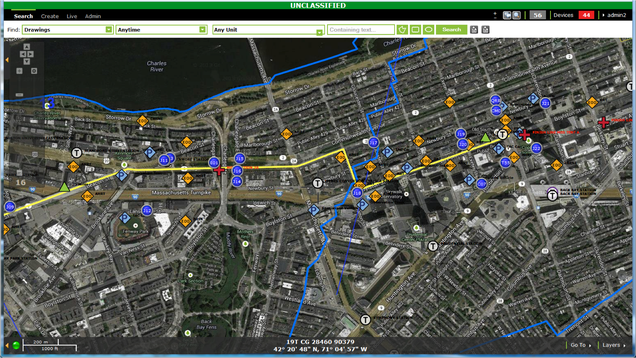
A smartphone system developed by the blue-sky research arm of the Pentagon was implemented at the 2014 Boston Marathon, Gizmodo reports.
The Pentagon launched the Transformative Apps program under the DARPA umbrella. The TransApp mission, as stated on DARPA's website, is to "develop a diverse array of militarily-relevant software applications using an innovative new development and acquisition process." The hardware itself is basically the same as what everyday Americans are walking around with every day. The big difference comes in how they're connected. Since civilian networks can't be trusted, soldiers must constantly set up secure networks on the fly using a suite of radios and networking equipment. Accordingly, TransApp developed a system that soldiers could plug smartphones into and gain basic connectivity. The corresponding apps are also designed to maintain functionality, even when they go offline.
The DARPA program manager responsible for TransApp, Doran Michels, told Gizmodo how the program developed and eventually came to be used in Boston:
Doran told me the history of TransApp the way a proud father talks about his family. The program started in 2010 with a budget of nearly $79 million over four years. (That's not a lot of money for a military with a total budget of over half a trillion dollars.) TransApps saw its first action in 2011, when 3,000 systems were deployed in Afghanistan, where Doran says the program received overwhelmingly positive feedback. The Army troops that were testing the apps used a variety of different devices depending on the specific tasks, but Doran told me the military settled on consumer-ready smartphones, rather than going through the rigamarole of designing their own proprietary technology. All of the devices Doran showed me in the TransApps office were Samsung.
In the years since, TransApps has been used for everything from training soldiers to improving security at the Boston Marathon and Presidential Inauguration. Doran's particularly proud of the integration in Boston a few months ago, since the high-profile event depends on the complicated coordination of several local and national agencies. Everyone from the FBI to the Boston Fire Department needed to know what everyone else is doing, and the same types of apps that keep soldiers organized in the battlefield worked perfectly there. You can see from a screenshot of the app they were using, where the specific units and checkpoints are located and how an officer in the field could search and sort for more granular information.
Read the whole story.
